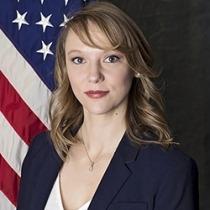
Kerianne L Hobbs
What is your next adventure?
I will remain where I am now. For the last nine years, I've worked at Air Force Research Lab (AFRL) in Dayton, Ohio, where I am currently a research aerospace engineer on the Autonomy Capability Team (ACT3). I am looking at whether we can use run time assurance to bound autonomy -- that's a way of monitoring an autonomous learning controller while it's in operation. We think of that as sort of a 'leash' for an autonomous system -- a way you can let it run but no so far that it will get into trouble.
What about your next adventure are you most looking forward to?
I think there's a lot of freedom in my research, room to continue down the path I started during my PhD program and answer interesting questions. Working with Dr. Feron, I had a great mentor who helped me really explore my research interests. At AFRL, my group's goal is to operationalize AI [artificial intelligence] and I've never really done anything with AI and machine learning. I'm excited about what I'll learn.
Did you have any previous co-op, internship, or research experience in this area?
I am a non-traditional PhD student, because I am still working for the AFRL and was only in residence at Tech for one year, 2017. I came to Georgia Tech because my research interests were at the intersection of aerospace, computer science, systems engineering, and psychology. I wanted to better be able to contribute in my cross-domain research area and I knew that Dr. Feron was not afraid to jump across different disciplines to get answers. What I learned from him and from Dr. Lightsey was how to create your own research project at the doctoral level, rather than having a well-formulated problem handed to you. The biggest thing I took away from them was to always go back to first-principles. Have a fundamental understanding of every assumption that goes into an equation. Where does that equation come from and what are its impacts? I approached my work in a much more rigorous way as a result.
How did your educational experience at Georgia Tech help you to achieve your goals?
I had great advisors and mentors. Dr. Feron understood that I came with a breadth of experience and that I was going to use that experience and my research to more thoroughly understand my dissertation topic. He had a way of not answering my questions, but asking a lot of questions in return - I needed to find the answer. He helped me to craft a research topic that I was passionate about, one that I'm continuing today in my career.
What advice would you give to an underclassman who would like to follow the same path?
There are many ways to achieve a goal and never forget your passion for aerospace, especially when preparing for your qualifying exams. My path to the PhD wasn't traditional. But most paths are not linear. If you have a goal and obstacles in your path seem insurmountable, remember there are many ways to your goals. Don't get in your own way with excuses.
For me, the quals started out seeming like insurmountable barriers. I thought for certain they would prove that I did not deserve to be at Tech. You'll have to be the smartest version of yourself that you'll ever be when you take quals. Studying becomes a lot easier if you remember that curiosity, that enthusiasm that got you into research to begin with. Remember how thrilling it is to learn. I found different paths to study for quals from 500 miles away. I joined virtual study groups with other doctoral students and I studied every weekend, no matter what, from January until August. At work, I found opportunities to give talks on topics that were covered in the quals. I knew some of the people at those talks were experts in these subjects and could give me feedback that would help me. Plus, the fear of making a fool of myself in front of PhDs was a good simulation of quals. Choose love of your work in spite of a fear of failing and find your way there.